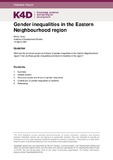| dc.contributor.author | Carter, Becky | |
| dc.coverage.spatial | Armenia | en |
| dc.coverage.spatial | Azerbaijan | en |
| dc.coverage.spatial | Georgia | en |
| dc.coverage.spatial | Moldova | en |
| dc.date.accessioned | 2021-05-04T12:48:53Z | |
| dc.date.available | 2021-05-04T12:48:53Z | |
| dc.date.issued | 2021-03-10 | |
| dc.identifier.citation | Carter, B. (2021). Gender inequalities in the Eastern Neighbourhood region. K4D Helpdesk Report 977. Brighton, UK: Institute of Development Studies. DOI: 10.19088/K4D.2021.062 | en |
| dc.identifier.uri | https://opendocs.ids.ac.uk/opendocs/handle/20.500.12413/16578 | |
| dc.description.abstract | This rapid review examines evidence on the structural causes and drivers of gender inequalities in the Eastern Neighbourhood region and how these gender inequalities contribute to instability in the region. While the Eastern Neighbourhood region performs relatively well on gender equality compared with the rest of the world, women and girls continue to face systemic political and economic marginalisation and are vulnerable to gender-based violence. Research on Armenia, Azerbaijan, Georgia, and Moldova identifies the key underlying cause to be a set of traditional patriarchal gender norms, intersecting with conservative religious identities and harmful customary practices. These norms do not operate in isolation: the literature highlights that gender inequalities are caused by the interplay of multiple factors (with women’s unequal economic resources having a critical effect), while overlapping disadvantages affect lived experiences of inequalities. Other key factors are the region’s protracted conflicts; legal reform gaps and implementation challenges; socio-economic factors (including the impact of COVID-19); and governance trends (systemic corruption, growing conservatism, and negative narratives influenced by regional geopolitics). Together these limit women and girls’ empowerment; men and boys are also affected negatively in different ways, while LGBT+ people have become a particular target for societal discrimination in the region. Global evidence – showing that more gender unequal societies correlate with increased instability – provides a frame of reference for the region’s persistent gender inequalities. | en |
| dc.description.sponsorship | FCDO (Foreign, Commonwealth and Development Office) | en |
| dc.language.iso | en | en |
| dc.publisher | Institute of Development Studies | en |
| dc.relation.ispartofseries | K4D Helpdesk Report;977 | |
| dc.rights.uri | https://www.nationalarchives.gov.uk/doc/open-government-licence/version/3/ | en |
| dc.subject | Development Policy | en |
| dc.subject | Gender | en |
| dc.subject | Rights | en |
| dc.subject | Security and Conflict | en |
| dc.title | Gender Inequalities in the Eastern Neighbourhood Region | en |
| dc.type | Helpdesk | en |
| dc.rights.holder | © Crown copyright 2021 | en |
| dc.identifier.doi | 10.19088/K4D.2021.062 | |
| dcterms.dateAccepted | 2021-03-10 | |
| rioxxterms.funder | Default funder | en |
| rioxxterms.identifier.project | Default project | en |
| rioxxterms.version | VoR | en |
| rioxxterms.versionofrecord | 10.19088/K4D.2021.062 | en |
| rioxxterms.funder.project | 9ce4e4dc-26e9-4d78-96e9-15e4dcac0642 | en |

